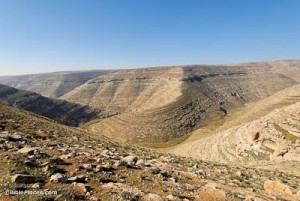Was anyone else struck by the contrasts in the Gospel, last Sunday, at Mass – contrasts in the events leading up to the coming of Jesus at Christmas time, when as St. John puts it: “… .. the Word became flesh and dwelt among us”. (See to whom the Word was revealed in the passage from Luke’s Gospel for last Sunday, the second of Advent year (Year C)).
“In the fifteenth month of the reign of Emperor Tiberias when Pontius Pilate was governor of Judea, and Herod was ruler of Galilee, and his brother Philip was ruler of the region of Ituraea and Trachonitis, and Lysanias ruler of Abilene, during the high-priesthood of Annas and Caiphas, the word of God came to John son of Zechariah in the wilderness.” (Luke 3: 1-2)
 |
The wilderness of Juda
Here, above, we are given a picture of an emperor, a governor, some princes or rulers, high priests who exercise their powers from palaces or from the temple. Then, in contrast, we see humble, small but decisive events, happening in the wilderness. The Word of God came to John, son of Zechariah. This contrast between the history of the great and powerful, and the seemingly insignificant history of simple folk who listen to the Word of God, is a constant theme in the work of the Lord. God does do great things, and he does them in the little, simple and humble events of everyday, such as we find in a family where there is love, forgiveness, understanding – totally divorced from the world of the powerful, the ruthless and the often murderous potentates of this world.
The contrast is even more striking because St. Luke refers to the wilderness, rather than a palace or even the Temple, because the wilderness belongs to nobody; the land is empty and without any value, and yet it is in such a wilderness that God’s power can act most distinctly, most directly. In the description of this event there is no human splendour or solemn ceremony. All we find is a man, dressed for the wilderness, who turns towards all humankind, promoting forgiveness and regeneration.
Presently, as in every year at this time, we are waiting this Advent to become Children of God. “But to all who received him, who believed in his name, he gave power to become children of God”, (John 1:12), and we do so when we allow the Word of God to grow in us. How does that happen? The Word of God grows in us, in so far as we welcome it, understand it and put it into practice. On this point Pope Paul VI is very explicit:
‘How is Jesus present in a soul? Through the communication to us of the Word of God. God’s thought, the Word, the Son of God made man enters us. We could even say that the Lord becomes flesh in us when we come to accept that his word dwells in us’. Did not St. Paul give birth to his Christians in the same way? ‘In Christ Jesus I became your Father through the Gospel’ (1 Cor. 4:15). Before we began to live the Word, the Word lived in us: it lives in us, forms us, guides and transforms us into the living Gospel.”
Let me share with you a simple event that might illustrate what I mean; what happened to me, happened in our parish, and, in my own mind it proves the point. I have changed the names and context so as not to embarrass anyone still living. In some ways, this story is of a devoted husband and wife, becoming the ones who contributed – along with many others – to the birth of the ‘Word in Me’.
In the 1980’s, I was asked to do the funeral of this wonderful parishioner, Matt. He was not just a parishioner, but also a friend, and he and his wife, Jenny, are like the very best of Christians. They are like John the Baptist, open to God’s word in the wilderness, as they had a ‘wilderness experience’ that nobody would every wish for themselves. Like John, they were humble, simple Lancashire folk, and nobody would ever consider them of the slightest importance in world terms.
 |
Once upon a time, Matt and Jenny would never fail to come to Sunday Mass. But, for the last year and a half of Matt’s life, he could not speak: nor could he eat (save through a tube), nor move; nurses had to come into his house, equipped with a special bed, yet, he never complained. He was always delighted to see people, and so was Jenny, his wife. Neither of them thought themselves as good, or holy, or anything like that. Matt had always been a quiet man, but his silent goodness, and joy on his death-bed for something like 18 months, were more eloquent to me than anything else in the world.
There are three children of the marriage, and not one of them is a Church-goer. One of them, Lizzie the unmarried one, has such a good understanding about how to love. She is very close to a holy, diocesan priest of those years, and she remains a good, yet confused, lady. The others are also special, kind and loving, each in their own way.
God certainly writes straight with crooked lines!
Another came to see me, recently about his own situation, and it seems that this other person thinks that God has a “twisted and nasty sense of humour”! It was not very pleasant for me to have to listen to this opinion of God, whom I would like to hold as the principal good in my life; however, I suppose through the great gift of ‘knowing’ God – a knowledge that the Holy Spirit has given me – together with my own lack of sensitivity – I am able to empathise, a bit with others; this enables me not to be too upset, to overcome and move on ahead. In total contrast, Jenny and Matt never blamed God for their long, drawn-out experience of meeting death.
I learned a lot from Matt all those years ago, and it has stood me in good stead. I have no idea how Jenny, and he, were so persistent in their love of God, despite their difficulties, and without the tangible gifts of God’s love, that I have experienced. Even so, the ‘Word of God’ grew in them as, God willing, the Word will grow in me, and in us, becoming ‘Flesh in us’ as we journey on.
And so, we become Children of God, if we accept the Word made Flesh, welcome Him into our lives, and live with him as an intrinsic part of our innermost self.
Fr. Jonathan
